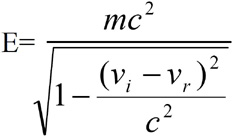Quote:Arguments? Thoughts? Other examples?
Well this thread which began with the topic "the existence of nothing" has certainly evolved.
It has certainly taken a lot of strange turns, but perpetual motion machines (violating the 2nd law of thermodynamics) and arrows of time seem to be leading us back to the overall thesis -- that of a programmed reality.
Light cones and
Planck lengths should tell us something about the nature of our reality. Reality definitely has its limits. e.g.
http://www.ted.com/talks/george_smoot_on_the_design_of_the_universe.html Returning to my theme, then:

We simply need to recognize those limits in our mathematical formulas and accept reality for what it really is -- nothing.
So objectively, the
physical existence of
something is probably even less plausible than the existence of
nothing.
Yet subjectively, there must be the metaphysical existence of the I AM.
Then, the probability for us to be so imperfect as to be the constant victim of deception would require an external power at least in proportion to the power possessed by the cause of such a deception. Thus, there is nothing believed to be true which is impossible to doubt, where faith and doubt are merely two sides of the same coin. So, when we consider our own doubt then, we must doubt the truth of all things with equal vigor as we would doubt their falsity.
Yet, things cannot be what the mind alone perceives them to be, because even though in a constant state of change, it would be insane to suggest that every thing is imagination only. This is not a circular logic, rather it introduces the concept of extension, whereby extension means that things exist in space only as an extension of our perceptions. Yet empty space, which we perceive as nothing, is abhorrent to believe as something that exists. Thus this empty space is only an extension of those things that are contained in it and those things contained in it are extensions of our perceptions of what we perceive them to be. This state of extension is the existence of our corporeal (physical) world, as we perceive it. Yet the question remains, whether our perception is the least bit necessary in order for the corporeal world to exist, i.e. the age-old adage, "if a tree falls alone in the woods, will it make a noise?"
Until this point in our analysis, there has not been one iota of proof that we could ever use an affection to cast out error or to cast truth onto any of our ideas. And there seems to be no such power to allow us to use affection, such as hope or faith, with such power to decide unequivocally the truth of physical existence or of its falsity. Faith and hope are but affections on the sides of the same coin, opposite of doubt and fear. Falsity also arises when our ideas represent what is nothing as if it were something.
But if we owe one causes existence to another cause, then we demand again, for a similar reason, whether this second cause exists of itself or through another being, until, from stage to stage, we at length arrive at an ultimate cause. Therefore, let us re-convince ourselves of the certainty of the following statement and with purpose and conviction; let us reconvene to tell ourselves: we are not alone. This world is a created virtual realm -- a program if you will.
http://www.youtube.com/watch?v=32Ey2WYvprA
